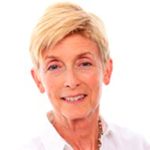A: It just made me feel so appreciated. I’m not a big researcher. I don’t run a department. I suit up and show up every day and see patients. To have people recognize my contribution to that and to our teaching program for our young rheumatology fellows—it was just really remarkable. I was deeply touched.
Q: Why is working with veterans rewarding?
A: People have a lot of ideas about veterans. They’re like your dad or your uncle. They’re like family, and they’re very grateful for the care that you give. But they also have a lot of real diseases. One of the things I’ve always appreciated about the VA is that they allowed me to practice to my full potential as an independent practitioner to treat a population of veterans. That’s allowed me to have significant growth that other nurse practitioners have not have had the opportunity to experience.
Q: Why do you love teaching?
A: I’m innately a teacher. I have always been. Sharing knowledge that makes a difference in people’s lives has a powerful, powerful impact. I’ve been following some of my patients for 20-plus years. I have seen them over time get into disease remission. It changes their lives. It’s satisfying because it empowers people. And to me that’s what teaching is.
Q: How enjoyable is the career path of an independent NP?
A: It’s fabulous. Over the years, it builds a real core clinical education. It’s given me a lot of confidence to practice. But I also know I have other experts to bounce a case off. That’s allowed me to have significant growth that other nurse practitioners have not. In talking with other nurse practitioners, they are amazed sometimes at the real richness of my practice.
ARHP Lifetime Achievement Award
 Patricia Katz, PhD, Professor of Medicine and Health Policy, University of California San Francisco
Patricia Katz, PhD, Professor of Medicine and Health Policy, University of California San Francisco
Background: Dr. Katz studied measurement theory and exercise science before “stumbling” into a career in medicine—how fortunate for the field of rheumatology.
“When I moved to San Francisco in 1986, I got a job working at UCSF, and I’ve been there ever since,” she says. “Soon after I started at UCSF, I began working with Ed Yelin, who was doing research in rheumatoid arthritis, and it just resonated. That was 25 years ago. It was an accidental, fortuitous occurrence.”
Dr. Katz’s research has appeared in more than 200 publications, with her primary interests being the measurement of patient-centered outcomes and the impact of lifestyle factors—primarily obesity and physical activity—on outcomes. She has served the ARHP in many capacities, including on the Program Committee and Subcommittee on Diagnostic, Classification, and Response Criteria. She is a past editor of Arthritis Care & Research, has attended every ARHP meeting since 1990, and served a three-year term on the Rheumatology Research Foundation Scientific Advisory Council.



